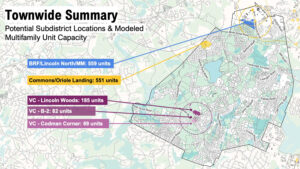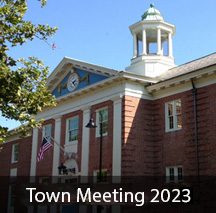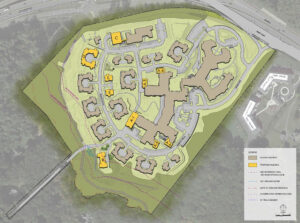
The five parcels proposed for multifamily rezoning (click to enlarge). Some combinations of four of them would satisfy HCA requirements.
Five parcels of land in Lincoln have been identified for possible multifamily rezoning to satisfy the state Housing Choice Act, according to a consultant hired to help the town comply with the law. In a separate effort, the Rural Land Foundation is also proposing to rezone the area occupied by the Mall at Lincoln Station to allow redevelopment of the mall along with multifamily housing.
The HCA and mall initiatives were both presented at a multiboard meeting led by the Housing Choice Act Working Group on June 6. There will be two public forums later this month where residents can get information and ask questions, and more detailed proposals will be presented at the State of the Town meeting in September in preparation for a vote at Town Meeting in March 2024.
The state law aims to encourage more transit-oriented zoning areas on land surrounding MBTA stops by mandating “by right” zoning of at least 15 units per acre across the district. Lincoln, which has two MBTA stops (the train station and bus stop), must allow a total of 635 units.
The timeline is tight because the HCA requires commuter-rail towns such as Lincoln to have a rezoning plan in place by 18 months from now. Plans must be presented prior to a townwide vote ahead of time to the state Department of Housing and Community Development, which (along with the Attorney General’s Office) must also sign off after voter approval at Town Meeting — all by December 2024.
Early proposals for rezoning parts of Lincoln have identified five candidate parcels, four of which together would allow enough multifamily units to satisfy the HCA. Three of the parcels are in South Lincoln near the train station; the others are in north Lincoln around Oriole Landing and the Lincoln North office complex. Four of the five possible subdistrict combinations would meet all the conditions.
“You have options as a town. This is a good place to be,” said Will Cohen of consulting firm Utile Design.
- Download the Powerpoint slide deck from the June 6 multiboard meeting
Towns aren’t required to create a single multifamily district; they may split it up into several nonadjacent subdistricts. However, the work to determine which areas would together meet state requirements is constrained by a complicated set of rules and formulas. For example, one of the subdistricts must account for at least half of the district’s total land area; all the land targeted must be developable (i.e., not conservation land or wetlands); and existing properties may not be divided into more than one new zone.
In Lincoln, the district must total at least 42 acres, and 20% of that land must be within half a mile of the commuter rail station. Some of it may also be around the bus stop at the corner of Hanscom Drive and Old Bedford Road. The working group focused on those areas as well as others that already have multifamily housing.
Additional wrinkles:
- Since the HCA is aimed at residential zoning, commercial use cannot be required in a compliant district (though it may be allowed). This limits the ability to require mixed-use development in places like South Lincoln.
- Lincoln now requires 15% of the units in multifamily developments to be income-restricted, but the HCA doesn’t have any requirements around affordability. In fact, if a town wants to have a zone mandate that more than 10% of the units are affordable, it must pay for an independent feasibility study that will demonstrate that that local requirement will not hurt the economic viability of a proposed project. Lincoln has already taken steps to have such a study done.
Lincoln and other towns can require developers to submit a site plan review and comply with reasonable design guidelines relating to traffic circulation, screening, lighting, etc., but “they can’t put out guidelines that make it impossible to do something,” Planning Board member Margaret Olson noted.
Finance Board member Andy asked if the state would pre-approve several rezoning proposals and allow voters to choose which one they preferred. “Lincoln has a history of getting state approval, [then] turning things down at Town Meeting and getting in a bind,” he said, referring to the school project that was pre-approved and partially funded by the state but was subsequently shot down at Town Meeting in 2012.
“That’s a great question that I don’t know the answer to,” Cohen said.
The HCAWG public forums will be on:
- Friday, June 16 at 8 a.m. in person at the Town Hall
- Tuesday, June 20 at 7 p.m. via Zoom — click here to register.
Redeveloping the mall
Along a parallel path in recent years, the Rural Land Foundation has been thinking about how to redevelop and revitalize the Mall at Lincoln Station to make it more attractive to commercial tenants and encourage multifamily housing. They propose to create a mall subdistrict that could accommodate 42 housing units above the building now housing the Bank of America and other stores (the portion with the post office and restaurant would not be affected).
“We though that looked pretty nice and in keeping with a town village center feel,” said Michelle Barnes, chair of the Lincoln Land Conservation Trust/RLF Board of Trustees, as she showed a rendering of one idea. “Greater density doesn’t have to look as scary as we might think.”

An artist’s rendering of one concept for how the mall might look after rezoning and redevelopment. Donelan’s is the white building at left rear.
As a commercial use, the mall area can’t be in the HCA district, as noted earlier. Instead, the town could rezone the mall to allow mixed use by right while also ensuring that commercial space is preserved.
A better quality of commercial space is crucial for the economic viability of the mall, which the trustees see as “an increasingly risky and hard-to-justify fiduciary obligation of the RLF,” Barnes said. However, without the opportunity for a developer to create a viable mixed-use project, the value of the mall will decline and the RLF will probably need to sell it (which it may have to do in any case).
RLF doesn’t have the capital to redevelop the mall by itself, so the group is working with CIVICO, which won approval for and built Oriole Landing before selling it in 2022. The RLF and CIVICO are conceptualizing a project with the idea that the mall would eventually be sold to the company, but contingent on an agreed-upon design “in keeping with the town’s ethos and values” that’s developed with input from residents and town leadership, Barnes said. To guarantee long-term financial viability for the project, a minimum of 25 housing units per acre built above the commercial spaces would be needed, she added.
Along with the HCA proposal, a mall rezoning measure will be presented at the State of the Town meeting on September 30 and at Town Meeting in March 2024.





